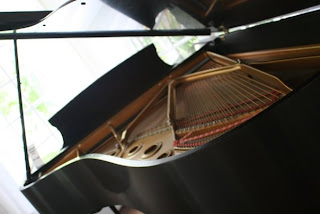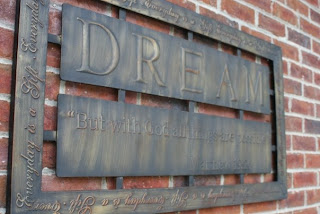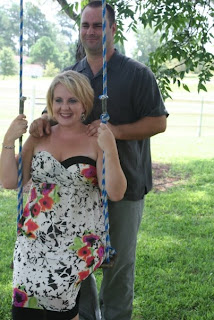So no sooner do I say "barring circumstances beyond my control I will be running a half marathong in November" ... I get circumstances beyond my control!
I haven't blogged very consistently the past few weeks. I have been suffering from awful headaches - migraines that won't die - pain on the left side of my head that won't go away - dizziness that is becoming more consistent and increasingly frequent severe vertigo attacks. I had been to my Primary Care Physician, the ER, the neurologist, and my ENT. I thought that I was just stressed out from the PMP Exam prep and that if I could just get past the PMP Exam and stop thinking about the exam and get some rest I would come out just fine on the other side.
But after the exam the pain and the headaches were not leaving and I found myself increasingly dizzy. We tried the "usual" treatments that have always worked for my migraines in the past, but I started having a nagging feeling that something else was causing the pain on the left side of my head.
Left side of my head ....... yeah - so there is so much going on with me on that side of my head. I have had 5 surgeries on my left ear. Yes, 5. I have always had some hearing loss in my left ear. The summer before my senior year in high school I went on a mission trip with my best friend. We spent much of that time arguing. I was saying "What?" a lot and it was a bit frustrating for my friend. I remember at one point she looked at me and said "You're not listening to me. If you were listening to me you wouldn't be asking 'What?'" In her defense - who thinks a 17 year old has a hearing problem? When I got back from the mission trip I talked to my mom about how frustrating it was that I was finding that I couldn't understand what people were saying. She said "Well, remember you've always had trouble with your left ear - we'll make an appointment to get it checked out." So after several doctors appointments and seeing an ENT it was decided that they would do some exploratory surgery on my left ear. My ear canal was very small - like my body grew, but my ear canal never did. They weren't sure what they would find when they opened up my ear canal and were able to see past the ear drum. They actually did a skin graft from my left arm and used that skin to open up my ear canal. They said that when they went in my ear drum was thickened - like it had cartilege on the back side and they wanted to do another surgery to explore my middle ear after my ear canal was healed. I had my first surgery in April of my senior year and the second surgery in July before heading to college. The second surgery was pretty much exploratory. They decided to leave the bones in my middle ear alone at that time, but warned me that I may need to have prosthesis bones put in later in life. The work that they had done on my ear canal improved my hearing tremendously.
After my children were born I found that my hearing was getting progressively worse again. Now I lived in Michigan. I found an ENT there and he decided that it was time to try to put prosthesis bones in my middle ear as they had deteriorated to the point of not being able to provide enough conductivity for adequate hearing. So I had surgery to put prosthesis bones in my middle ear.
After that surgery and I had the packing removed I was so excited! I could hear so well! Almost too well! I could hear the blood pulsing through my head I could hear so well. It was almost overwhelming and took a lot of getting used to. About 2 months after that surgery I came down with bronchitis. During a coughing fit I suddenly lost my hearing. I went to the ENT and he discovered that the prosthesis bones were protruding through my ear drum. We thought it was just an unfortunate incident related to the bronchitis, so we decided to try again a few months later. But again, a couple of months after that surgery the prosthesis bones worked their way out through my ear drum. Apparently my body was having no part of these prosthesis bones. I was fitted for a hearing aid and I resigned myself to the fact that I was going to have to wear a hearing aid at the ripe old age of 29.
The hearing aid was wonderful when I first started wearing it. Surround sound! Who knew? But I would wear the hearing aid and then I would get an ear infection and not be able to wear it. It would take a couple of weeks to clear up and then I could wear the hearing aid, but only for a few weeks before I would et yet another ear infection.
During that time I moved to North Carolina and I found a new ENT. Dr. Mann. I was having another ear infection and was very frustrated that I was not getting full use of my hearing aid. During my first appointment with Dr. Mann he said "Well, we can't keep going down the road of trying to restore your hearing in the ways you have tried before - that obviously isn't going to work. But I would like to challenge you to think 'outside the box' regarding getting your hearing back to an acceptable level." OK - cool - I can do that - I can think outside the box. He proceeded to tell me about the BAHA (Bone Anchored Hearing Aid). It starts with putting a small titanium implant in the bone behind the ear. The titanium fuses with the bone via oseointegration. That implant then transfers sound vibrations to the functioning cochlea. So yeah - you read that right - they put a screw in your head. A sound processor then "snaps" on to the implant to process the sound and transfer it to the titanium implant. All I could hear was "screw in your head". Yeah, doc, I don't know what box you were in - but I'm not thinking outside that box - sorry. But he encouraged me to think about it and to consider it. I came back about a month later for a follow up visit and he asked me if I had thought any more about the BAHA. Nope - I haven't thought about it at all because you're nuts if you think I'm putting a screw in my head. But he pushed the issue further and told me that I could actually try the BAHA without having it "installed" via a headband that I could wear. He would even allow me to take it home for a week so that I could try it in different settings, etc... OK - fine - I will try it. He had me meet with the audiologist who explained everything to me and fitted the headband for me and sent me on my merry way. It was about a 20 minute drive home and by the time I pulled into my driveway I said "It looks like I'm getting a screw in my head!" It was amazing! I could hear again! The advantages to bypassing my ear canal and middle ear with the BAHA were very compelling and I decided to go ahead with having the BAHA installed. That surgery was December 23, 2004. I love my BAHA! And you would never know I have one unless I show it to you - and I show everyone! :) Since having the BAHA installed my ear infections have gone drastically down and I can once again hear my children. It's fantastic.

So that leads us to my thought regarding pain in the left side of my head ... hhhhhmmmmm ... I wonder ... I haven't been to the ENT in 3 years - maybe I should get my ear checked out. My appointment with the ENT was the day after my visit to the ER for some headache "snake juice" to knock my headache out. While in the ER the doc looked in my crazy left ear (no one ever looks in there and says 'Yup - that looks normal.' because it so is the farthest thing from normal in there) and declared my ear fine.
I went the NEXT DAY to the ENT and the Physician's Assistant declared that I had a raging infection - that there is no way anyone could look in there and declare that OK. I had blood and puss in the ear canal and she needed to clear that up in order to see further to what was going on in my ear. She used a small vacuum to try to clean it out which sent my dizziness into full force. She put me on Ciprodex drops to clear up the infection and renewed my prescription for Meclazine to help with the dizziness.
Over this past weekend I started the Ciprodex drops, but whenever I would put the drops in I would have a severe Vertigo attack. It was awful. So on Monday I called the ENT back and explained the situation. He asked me to come back in today so that he could see what he could see.
Today when I went back I was able to see what he saw - he used a microscope that had a camera in it that projected on a TV that I could see. I geek out over that stuff. There was most obviously something in there that shouldn't be. And when he touched it to try to get it out the vertigo was set off again. Dr. Mann said it was a cholesteatoma.
What is a cholesteatoma? A perforation of the ear drum will generally heal without surgery. In some cases, however, instead of normally healing, the skin of the ear drum can grow through the hole into the middle ear. If infection is present, the skin will continue to grow into the middle ear and will become a tumor of the ear termed a cholesteatoma. Cholesteatomas are NOT a form of cancer. They are benign tumors. As they grow, they can look like an onion peel of white skin formed into a ball.
Cholesteatomas actively erode bone because they contain enzymes which are activated by moisture. In time, cholesteatomas will eventually erode the bone leading into the inner ear. This can cause nerve loss and deafness as well as severe imbalance and dizziness. The thin plate of bone that separates the roof of the ear from the brain can also be eroded by cholesteatomas. This exposes the covering of the brain. In extreme situations, it can lead to brain infection and other severe complications.
Cholesteatoma is a serious condition and, when diagnosed, requires prompt treatment. Medical treatment concentrates on drying the infection within the ear. Antibiotics, given both by mouth and drops in the ear, combined with weekly cleaning of the ear under the surgical microscope, can clear up the infection.
A (CAT) CT scan is obtained by the ear surgeon to determine how much the cholesteatoma has spread in the ear.
The bone behind the ear is called the mastoid bone. It connects to the middle ear. In a healthy ear, it is filled with air. In most cases of cholesteatoma, the mastoid bone is filled with irritated mucous membranes and cholesteatoma itself often grows into this bone. The CAT scan will guide the ear surgeon as to how far the cholesteatoma has grown and whether it has eroded into the inner ear or brain. The CAT scan will also indicate the degree to which bones of hearing have been eroded.
Some of the risks that Dr. Mann has highlighted to me that he will be very careful to monitor during surgery are risks to the nerve hearing that I do still have in my left ear. I have lost a siginificant amount of hearing in that ear, but it seems to be all conductive hearing or bone hearing. My nerve hearing is still in tact. Fortunatley, I do already have the BAHA and could rely on that should anything happen to my nerve, but it would be markedly reduced from what I currently enjoy.
Also, with any surgery that involves the middle and/or inner ear there is concern about several nerves that run through that area. One is a facial nerve that provides feeling and motion to that entire side of my face. Another nerve is one that provides taste to that side of my tongue. With all the surgeries I have had on my ear I already have some funkiness going on with the taste. Anything that goes in my left ear makes me taste metallic - I would hope that would not become permanent. He will employ facial nerve monitoring during surgery to lessen the risk of anything happening to the facial nerve, but it is something that he wanted to be sure to discuss with me. I have had this discussion around every ear surgery I have had. So I am used to hearing about this risk.
Dr. Mann believes that the cholesteatoma that we could see via the microscope in his office has grown into the middle ear and is either cramping the inner ear or the vestibular nerve. What we could see in the office was the part that had grown into the ear canal - he believes it is a bit bigger behind the ear drum.
So to circumstances beyond my control ... I don't think I'm going to be able to train quickly enough for the November 1 half marathon. I am very disappointed about this. I have been very frustrated that I haven't been able to run or workout like I would like to due to the pain, migraines, and dizziness. I am anxious to get back to working out more regularly. Heck - half the time I don't even drive myself places right now. And I hate being reliant on others for basic things like going to work.
My surgery is scheduled for Monday, September 28 - not even two weeks from now. I am relieved to have an answer to the pain that won't go away and the troubling dizziness. No one wants to have surgery, but if that is what will help get me back to normal - I am all for it.
I had to open my big mouth and just say "circumstances beyond my control" didn't I?





























